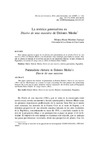Identificador persistente para citar o vincular este elemento:
https://accedacris.ulpgc.es/jspui/handle/10553/72416
| Campo DC | Valor | idioma |
|---|---|---|
| dc.contributor.author | Martínez Sariego, Mónica María | en_US |
| dc.date.accessioned | 2020-05-14T14:06:24Z | - |
| dc.date.available | 2020-05-14T14:06:24Z | - |
| dc.date.issued | 2012 | en_US |
| dc.identifier.issn | 0034-849X | en_US |
| dc.identifier.other | WoS | - |
| dc.identifier.uri | https://accedacris.ulpgc.es/handle/10553/72416 | - |
| dc.description.abstract | This paper analyzes the rhetoric of paternalism in Dolores Medio's Diario de una maestra (1961) and its effectiveness as a means to evade censorship. For that purpose the relationship between the novel and its basic intertexts will be considered: the Ovidian myth of Pygmalion and Benito Perez Galdos' El amigo manso (1882). | en_US |
| dc.description.abstract | Este trabajo pondera el peso de la retórica del paternalismo en la novela Diario de una maestra (1961) de Dolores Medio y su efectividad como estrategia para burlar la censura. Para ello se aborda la relación de la novela con dos de sus intertextos básicos: el mito ovidiano de Pigmalión y la novela El amigo manso (1882) de Benito Pérez Galdós. | en_US |
| dc.language | spa | en_US |
| dc.relation.ispartof | Revista de Literatura | en_US |
| dc.source | Revista De Literatura [ISSN 0034-849X], v. 74 (148), p. 555-570 | en_US |
| dc.subject | 6202 Teoría, análisis y crítica literarias | en_US |
| dc.subject.other | Dolores Medio | en_US |
| dc.subject.other | Diario De Una Maestra | en_US |
| dc.subject.other | Rhetoric Of Paternalism | en_US |
| dc.subject.other | Pygmalion | en_US |
| dc.subject.other | Retórica paternalista | en_US |
| dc.subject.other | Pigmalión | en_US |
| dc.title | La retórica paternalista en Diario de una maestra de Dolores Medio | en_US |
| dc.title.alternative | Paternalistic rhetoric in Dolores Medio's Diario de una maestra | en_US |
| dc.type | info:eu-repo/semantics/Article | en_US |
| dc.type | Article | en_US |
| dc.identifier.doi | 10.3989/revliteratura.2012.02.307 | en_US |
| dc.identifier.scopus | 84874892530 | - |
| dc.identifier.isi | 000314811300009 | - |
| dc.contributor.authorscopusid | 55620800100 | - |
| dc.description.lastpage | 570 | en_US |
| dc.identifier.issue | 148 | - |
| dc.description.firstpage | 555 | en_US |
| dc.relation.volume | 74 | en_US |
| dc.investigacion | Artes y Humanidades | en_US |
| dc.type2 | Artículo | en_US |
| dc.contributor.daisngid | 3446538 | - |
| dc.description.numberofpages | 16 | en_US |
| dc.utils.revision | Sí | en_US |
| dc.contributor.wosstandard | WOS:Sariego, MMM | - |
| dc.date.coverdate | Enero 2012 | en_US |
| dc.identifier.ulpgc | Sí | es |
| dc.description.sjr | 0,1 | |
| dc.description.sjrq | Q2 | |
| dc.description.sellofecyt | Sello FECYT | |
| dc.description.ahci | AHCI | |
| dc.description.erihplus | ERIH PLUS | |
| item.grantfulltext | open | - |
| item.fulltext | Con texto completo | - |
| crisitem.author.dept | GIR Estudios sobre humanismo, filología y pervivencia clásicas y literatura canaria | - |
| crisitem.author.dept | Departamento de Filología Hispánica, Clásica y de Estudios Árabes y Orientales | - |
| crisitem.author.orcid | 0000-0002-7541-3147 | - |
| crisitem.author.parentorg | Departamento de Filología Hispánica, Clásica y de Estudios Árabes y Orientales | - |
| crisitem.author.fullName | Martínez Sariego, Mónica María | - |
| Colección: | Artículos | |
Citas SCOPUSTM
1
actualizado el 08-jun-2025
Citas de WEB OF SCIENCETM
Citations
1
actualizado el 22-feb-2026
Visitas
54
actualizado el 10-ene-2026
Descargas
88
actualizado el 10-ene-2026
Google ScholarTM
Verifica
Altmetric
Comparte
Exporta metadatos
Los elementos en ULPGC accedaCRIS están protegidos por derechos de autor con todos los derechos reservados, a menos que se indique lo contrario.
